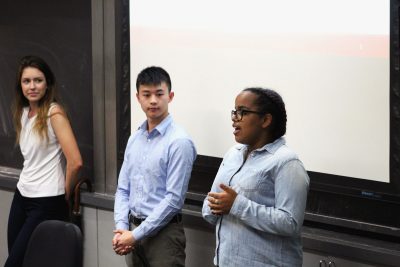
Boston University’s Student Government met Monday night to hear introductions from the senate’s three special interest parties and go over a mock senate proposal.
SG Senate Chair Andrew Chiao began the meeting by talking about the senate leadership training that took place Saturday. Chiao said he thought the training was a success and emphasized the importance of building a community within the senate.
“There’s over 40 of us here,” Chiao said. “There’s a lot of brainpower and skill and passions spread across the board, so you get to meet someone else, and you might get to work with them together and be more successful than you might be by just working on your own.”
To further encourage senators to get to know each other, the senators, who usually sit with their respective college, were randomly assigned seats at the start of the meeting.
Aidan Connors, a freshman in the College of Arts and Sciences, said he thought the leadership training was a good bonding experience for the senate, and is looking forward to future meetings.
“I got to meet a lot of people,” he said. “In the upcoming meetings, I think it would be nice to get more focused on what we’re actually about, like making changes.”
Chiao then introduced the senate’s special interest parties and let representatives from the parties introduce themselves and their party’s goals.
Adrian Lee, a junior in the Questrom School of Business, from the BU RealPolitik party, talked first about his party’s concerns for student well-being, mentioning issues such as tuition and undergraduate fees.
Marielis Perez, a freshman in the College of Communication, then explained the goals of her party, First Year Enhancement, which focuses specifically on enhancing the college experience for first generation students.
“We’re working on improving this experience throughout all four years instead of just the first one,” Perez said. “That way, students can have that help throughout their whole college experience.”
Representatives from SG’s third party, the BU Leather Apron party, were not present.
Following the special interest introductions, Lee and Perez presented a mock proposal to the senate in order to show new senators how the proposal process will work in the future.
The mock presentation, which advocated for the hypothetical reinstatement of BU’s football team, included a prepared slideshow and an open discussion where the senators could ask questions and practice procedures for future proposals.
“The format that the discussion went through helped the senators understand how discussion works,” Chiao said. “… As people listened to these questions come forward, I think they got a better understanding of how we should be discussing proposals that come forward in the future.”
SG President Devin Harvin then gave his weekly address, where he discussed planning for the future spring concert and possibly trying to “change the culture around finals.”
The meeting concluded with the senate’s first open forum of the year, in which senators had the opportunity to raise concerns, propose ideas or plug events to the senate and E-board.
During the forum, Nehemiah Dureus, director of communications for SG, mentioned that he wanted the Student Activities Office to come to a future senate meeting to answer questions from the senators, expressing concern about the relationship between SAO and BU’s student clubs on campus.
“When students think about SAO, they always think of it as more of a problem than a solution,” Dureus said after the meeting. “This isn’t good, this isn’t healthy for a student body on campus. So I’m hoping we can bring SAO to senate and start the dialogue of trying to get it to a good place.”
Dureus added that SAO came to a Student Government meeting last year to talk about making changes, and now he wants to “hold them accountable.”
Harvin said he thought students wanting to talk to SAO about their activities is a “valid concern.”
“If that’s something students want to pursue, then I’m down with that,” Harvin said. “We have great connections with the SAO, they help us out a lot, we worked with them together on the spring concert.”
Overall, Chiao said he was happy with the way the first forum went.
“We set a good standard of what open forum should be tonight,” Chiao said. “Not just plugging events, which it has been in the past. Making it a place for open discussion so that there is something that really needs to get talked about, we have the opportunity to talk about it.”
Lexi Matthews contributed to the reporting of this article.






















































































































